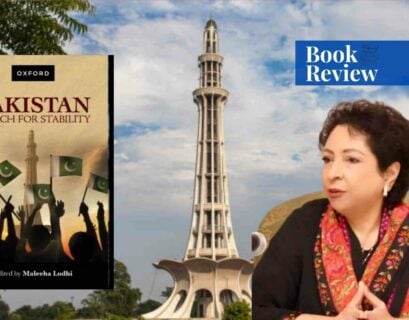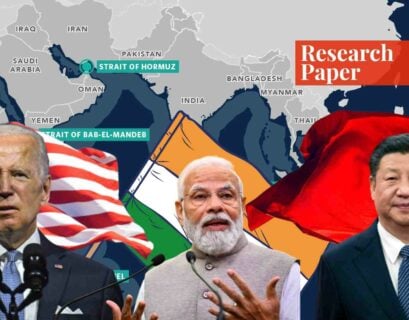Taha Amir is a diligent student pursuing his bachelor's in defense and strategic studies at Quaid-e-Azam University, Islamabad. Currently, he is interning at The Consul Monthly Magazine.
Introduction
Stealth War: How China Took Over While America’s Elite Slept is a non-fictitious book written by Robert Spalding in 2019; Penguin Books issued the book. The author is a retired US Airforce brigadier general who served his country for 25 years. He also served as a senior defense administrator and attaché to China. He attained his doctorate in economics and mathematics from the University of Missouri.
The book “Stealth War” expounds on how China, without waging any war or conflict, ascended to become such a sumptuous power and is still dominating and enjoying its influence worldwide. The author mentions that he authored this book because he wanted to expose this sophisticated game of the CCP (Chinese Communist Party).
After serving the Pentagon and the government of the United States of America as China’s strategist, he ascribed that it was his esteemed will to expose CCP and its progressive policy of bogarting the world in every aspect and significantly countering the US. Consequently, the book’s central theme is disclosing China’s stealth war and its strategy to hog the planet by focusing on six spheres of influence: the economy, the military, global diplomacy, technology, education, and infrastructure.
The book is elegantly indexed into eleven chapters. The first two chapters explicate unrestricted warfare and the taciturn rise of communist China and the CCP. Then in chapters 3, 4, and 5, the author provides insight into topics like the economy, military crisis, and digital battlefield regarding the People’s Republic of China.
In addition, in chapters 6, 7, and 8, the writer jotted down modern warfare, politics, and diplomacy and China’s worldwide domination through infrastructure. Eventually, the last two chapters interpret beating China by its own sophisticated and stealthy war tactics and provide various solutions on how to combat and fight back against China’s stealth war.
Synopsis of the Stealth War
The author of this book expounds that China’s goals are apparent: gaining control and influence across the planet without resorting to military aggression. China is cautiously seizing control of the world’s shipping companies, infiltrating corporations and scientific laboratories, and engaging western investors. Furthermore, the author pens down that the PRC continues to focus on the six spheres of influence (economic, military, diplomatic, technology, education, and infrastructure) by using “our [US] capital against our interests.”
Moreover, he states that President Xi Jinping of China struggles to become the world leader in technology to seize the telecommunications market and export the totalitarian social control system to other countries. According to the author, the United States and all democratic countries “now face the greatest challenge since World War II, one with dire repercussions for the United States and the entire globe.”
The more Chinese-made merchandise flooding the local market, the more misanthropic the impact on nationwide austerities. However, the institute turned down the offer due to its board’s close ties to Chinese business circles. As a result, many US officials and delegates of think tanks and business circles famous on Wall Street remain heavily dependent on China.
The author tries to convince his audience that the US political leaders and financial nobility have one thing in common, “they have operated under the mistaken assumption that our interactions with China are part of average free-market competition.” Nevertheless, while free enterprise and democracy pose the greatest threat to the Chinese Communist Party (CCP) regime, Western capital flows allow the PRC to fund its economic, military, and technological advances.
Though the Soviet Union collapsed, the PRC ruthlessly exploited the ingenuity of the American political and business elite, while the strength of Western capital and free trade enriched Beijing. Moreover, today, the PRC is building railroads and ports to control the world’s sea lanes, while, as the author argues, it all begins with building the state economy or foundation of national security.
The author also elucidates that the US Post Office loses $170 million every year because it costs a lot more to send a 3-pound package from the White House to the Capitol, both in Washington but 3.2 kilometers away from another – than from the White House to Beijing, about 10,502 kilometers away. As part of a 1969 regulation to help struggling economies, the US Postal Service agreed to offer a deep discount for packages shipped from China weighing less than 2,000 pounds.
Furthermore, The People’s Republic of China is now pursuing a $1.3 trillion plan with a mission to control the economy and the world’s significant railways, highways, and seaports. Spalding provides an overview of how the PRC builds its dominant economic position and plans new acquisitions.
As the author rightly points out, the PRC has a solid position here; as of 2019, it exports 90-95% of rare earth metals such as dysprosium, neodymium, gadolinium, or ytterbium and may stop manufacturing electronic products anywhere in the world. China is also the world’s leading chemical fertilizers, cement, and steel producer.
In addition, the author also provides an insight into China’s modern warfare—5G future. For instance, China oversees millions of its citizens as Internet monitors. In 2013, China’s official state media announced that the CCP had chartered about two million “public opinion reviewers,” with another ten million volunteer college students spreading the Chinese narrative worldwide via Twitter.
However, China and Twitter-like WeChat officially blocked this. There is no more incredible opportunity than 5G wireless technology, the writer pens down, “When a Chinese telecom company builds and controls a nation’s 5G network, there will be no controls or countermeasures to prevent the Chinese company from exploiting any of the data it contains.”
Assembling a network is a matter of national security, not business or technology. The writer adds that since 2004, the Chinese government has set up Confucius institutes to spread communist agitprop. As of 2017, 90 facilities are in the United States, and more than five hundred are operating worldwide.
Forty-five million Chinese immigrants live in the United States, the originator pens in the book. In 2017, United States universities enrolled 350,000 Chinese students, accounting for 32.5% of the more than ten million international university students in the United States.
As the author points out in this work, the Chinese Communist Party passed the National Intelligence Law on June 28, 2017, giving the authorities broad powers to monitor and investigate all persons and companies in the People’s Republic of China and to provide intelligence services with a legal basis to conduct its work outside of China.
According to the author, the People’s Republic of China invests in innovative technologies like high-end numerically controlled machines and robots, aerospace equipment, marine engineering, high-end ships, high-end railway vehicles, new-generation and energy-efficient home appliances, agricultural machinery, biomedicine, advanced materials, plastics, and medical devices.
He also believes that America can and should continue to uphold values such as freedom of speech and religion, free-market principles, and democratic norms as it seeks to rebuild national infrastructure, strengthen the military and border security, and increase competitiveness. The United States fends digital information and technology and focuses on the need to patch control of the budget and international order.
Critical Analysis
The book “Stealth War,” authored by Robert Spalding, is quite biased because of several grounds. First, this book is transcribed by the author after his 25 years of service in the US Airforce and as an adviser to the White House, especially on US-China affairs. It depicts him as a patriotic citizen and statesman. Hence, the book mentioned above cannot be recommended to anyone considering the content and views described by the author are biased.
Yes, it cannot subdue all the mentioned scores and the worries that the author described China as a threat to all democratic states. Second, while exposing China’s silent war, if the author had compared it with America’s proxies worldwide, it would have been much better, and the book might have been considered nonaligned.
Indeed, the author’s views portray the current geopolitical situation and continuous growth of the People’s Republic of China in all spheres of the world, including economy, technology, military advancements, and many other aspects. Still, he expounded his views with great aggression and severity. Even if China is doing what he states, is it not better than the US which is almost involved in every world conflict, whether openly or via a proxy war?
Then, should we not admire China because even if it constitutes the desire to dominate the world, it is not causing any harm to humans and the world? It is fighting its silent war without firing a single bullet; it is not waging wars like the US, continuously causing deterioration to people of various world regions. Should we refer to all those wars? Thus, as per the following arguments, the author’s views align with his state’s interests only, not the entire world.
Moreover, It is stated that both states have certain demerits in their state structures and policies but expressing that one country is harmful to the whole world and one is the world’s well-being is very imprudent. On what basis the author recommends solutions to the world to counter China’s stealth war against the US when his own country is unceasingly changing the regimes, assassinating political leaders who spoke against the interests of the US, and engaging proxies all over the world to fulfill its objectives?
Being a chauvinistic citizen of Pakistan, one can also write books against one open enemy and criticize it without considering that one’s own country can also be wrong in some places, but that would be indiscreet. Therefore, one can have the right to facts, but one cannot have the right to validities. The book could be appreciable if this book were composed of neutrality and equity.
Conclusion
In a nutshell, the book Stealth War: How China Took Over While America’s Elite Slept elucidates China’s silent tactics and strategies to dominate and uphold its influence over the world and counter its primary competitor, the United States of America. Lastly, I would like to recommend this book to students of area studies, international relations, peace and conflict studies, defense and strategic studies, and especially to individuals who want to comprehend the US-China bitter relationship in detail and further are willing to research it.
If you want to submit your articles and/or research papers, please check the Submissions page.
The views and opinions expressed in this article/paper are the author’s own and do not necessarily reflect the editorial position of Paradigm Shift.



















